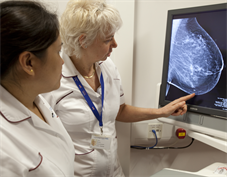Promising early results from PROSPECTS trial
12 November 2025 - Preliminary results show 3D scans improve rate of breast cancer detection

Initial results from a national trial suggest that 3D breast imaging technology is more effective than traditional 2D mammograms at screening for breast cancer.
Currently, 2D mammograms are used in the in the National Breast Screening Programme, which provides a free breast screening service for women aged between 50 and 71. This 2D technology is the most effective method of detecting early stage breast cancer, and it is estimated that regular breast screening saves around 1,300 lives each year in the UK.
The PROSPECTS trial, which began in 2018 and involved over 70,000 women, aims to investigate the accuracy, effectiveness and cost of breast cancer screening using 3D technology, compared to 2D mammography. The findings of the trial, due to be published in 2026, will be taken into consideration when deciding future development of the NHS breast screening service.
The preliminary results of the PROSPECTS trial, which were presented to British Society of Breast Radiology Annual Scientific Meeting on Tuesday 11 November 2025, indicate that the breast cancer detection rate increases by 40% when using 3D scanning technology. The results also suggest that 3D scans are more likely to detect Grade 2 and 3 invasive breast cancers, which are more likely to be clinically significant.

Tanya Bukvic was diagnosed with breast cancer in September 2024 after taking part in the PROSPECTS study at King’s College Hospital. She explained: “I had no symptoms at all ahead of my mammogram, nothing that would suggest anything could be wrong. On the day of my screening, I was given the option of a 3D mammogram as part of the PROSPECTS trial, and without realising it at the time, it saved my life. “A few days after my scan, I was invited back for further testing and my cancer was confirmed. Luckily it was detected at an early stage, and I had the tumour removed in October 2024, followed by radiotherapy.
“What I didn’t realise until much later was that I have extremely dense breast tissue, and that it is unlikely that my cancer would have been picked up on a normal 2D mammogram at such an early stage. I dread to think what would have happened had I not had a 3D scan that day – my recovery from breast cancer has not been easy, but things could have been so much worse.”
Dr Michael Michell, Consultant Radiologist at King’s College Hospital NHS Foundation Trust and Chief Investigator of the trial, said: “Previous studies of 3D mammography conducted in the UK and abroad have demonstrated improved accuracy in detecting small breast cancers, but this is the first large trial of its kind comparing the effectiveness of these two breast screening technologies.
“These preliminary results are extremely exciting and could potentially lead to faster diagnosis, and therefore better treatment and care for women with breast cancer.”
